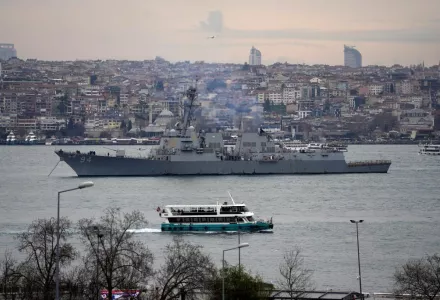"The Soviets exercise control of the Black Sea coastline with the exception of Turkey. Recent propaganda pressure for the acquisition of part of the Turkish coastline as far west as Trabzon and for control of the Dardanelles plus bases there indicates Soviet intent completely to dominate and control the Black Sea."
— Declassified documents from July 23, 1946, addressed to the U.S. President by George M. Elsey
Nearly 80 years ago, George McKee Elsey—an American naval commander and advisor to Presidents Franklin D. Roosevelt and Harry S. Truman—warned the President of the United States that the Soviet Union sought full dominance over the Black Sea. While this assessment dates back to the Soviet era, it was not mere Cold War speculation. Rather, it foreshadowed post-Soviet Moscow’s systematic efforts to turn the Black Sea into its strategic stronghold. More than seventy years later, Turkish President Recep Tayyip Erdoğan echoed similar concerns, declaring in May 2016 that "the Black Sea has almost become a Russian lake" and urging NATO to take countermeasures. Russia’s strategic aspirations in the Black Sea are not solely a Soviet-era or post-Soviet phenomenon. Since the time of Peter the Great, Russian rulers have viewed access to warm-water ports and control over the Black Sea as a stepping stone toward the greater Mediterranean, a goal that has persisted through Tsarist, Soviet, and modern eras.
While Moscow’s ambitions have been decades in the making, its dominance remains contested due to Ukraine’s naval resistance, NATO’s involvement, Turkey’s regional influence, and China’s finger in it—seeking to expand its economic foothold in the Black Sea.
Russia’s Post-Soviet Expansion in the Black Sea
Russia’s gradual assertion of control over the region can be traced through key military actions:
- The 1992–1993 Abkhazia War: The first major post-Soviet war—the 1992–1993 Abkhazia War—provided an early indication of Russia’s playbook for exerting influence in the Black Sea. In this conflict, Russia armed and supported separatists in Georgia’s breakaway region of Abkhazia, located on the eastern coast of the Black Sea. The brutal war resulted in the ethnic cleansing of over 250,000 Georgians, solidifying Russian-backed control over a strategic coastal territory.
- The 2008 Russo-Georgian War: Russia invaded Georgia, effectively annexing Abkhazia and South Ossetia (20 percent of Georgia). Moscow formally recognized Abkhazia’s independence and stationed permanent military units in the region, securing a stronger foothold in the Black Sea. In October 2023, Russia announced plans to establish a new permanent naval base in Ochamchire, just 50 kilometers from Sokhumi (in occupied Abkhazia)—a move to further cement its dominance.
- The 2014 Annexation of Crimea: The annexation of Crimea was not an isolated incident but a continuation of this long-standing pattern. By seizing Crimea, Russia significantly bolstered its naval presence, deploying warships, aircraft, and anti-air and anti-ship missile systems—effectively transforming the peninsula into a heavily fortified military base. Additionally, by gaining control over Crimea, Russia dominated the Sea of Azov, leveraging its military, economic, and logistical significance.
- The 2022 Full-Scale Invasion of Ukraine: Russia’s 2022 full-scale invasion of Ukraine further reinforced its strategy of using military force to solidify Black Sea control. Moscow seized key Ukrainian ports and imposed naval blockades, crippling Ukraine’s maritime trade while sending a clear message to NATO: the Black Sea is increasingly falling under Russian dominance.
-
Yet, despite these efforts, Russia’s dominance in the Black Sea is far from uncontested. A significant portion of its fleet has been lost to Ukrainian naval strikes, forcing it to relocate warships from Sevastopol to Novorossiysk. With three major littoral states (Turkey, Romania, and Bulgaria) being NATO members and Ukraine actively resisting, Russia’s long-term control over the region remains uncertain.
Russia’s Coercion, Blockades, and a Chinese Finger In It
Beyond military force, Russia employs naval coercion and strategic blockades to strengthen its grip over the Black Sea. Since its full-scale invasion of Ukraine, Russia has:
- Restricted Ukrainian access to the Sea of Azov, effectively making it a Russian-controlled waterway.
- Blocked Ukrainian grain exports, triggering global food security concerns.
- Increased its military presence near NATO allies, including Romania and Bulgaria, as a warning against further Western involvement.
- Unlike the South China Sea, where the U.S. routinely conducts Freedom of Navigation Operations (FONOPs), NATO’s ability to challenge Russian naval power in the Black Sea is constrained by the Montreux Convention (1936), which limits non-Black Sea warships. However, this treaty also gives Turkey significant control over who enters and exits the Bosporus and Dardanelles.
-
Russia has established a contested maritime zone in the Black Sea, where it continues to challenge NATO and Ukraine while seeking to maintain naval superiority despite recent setbacks. The real challenge for the U.S. and its allies is not just countering Russian influence militarily but also strategically investing in regional infrastructure and economic resilience to ensure long-term stability.
China’s Growing Economic Footprint in the Black Sea
While Russia’s ambitions in the Black Sea are well-documented, China’s attempts to gain economic influence in the region are a newer development. Beijing is not pursuing military expansion but is instead trying to invest in infrastructure and trade routes. On May 29, 2024, the Georgian government announced that a Chinese-Singaporean consortium would acquire a 49 percent stake in the Anaklia port, located in western Georgia on the Black Sea. However, negotiations remain ongoing, suggesting that key issues are still unresolved. If completed, the new deep-sea port at Anaklia would Serve as an additional hub for the Middle Corridor, enabling trade to bypass the Northern Corridor—which runs through Russia and Belarus—while further expanding China’s footprint in the region. That said, while the negotiations between Georgia and China are not yet a done deal, the United States still has a window of opportunity to prevent the Black Sea from falling further into Russian and Chinese hands.
Russia’s ambitions in the Black Sea are nothing new—they date back centuries. Through military aggression, coercive economic tactics, and strategic partnerships with authoritarian states like China, Moscow continues to entrench its dominance in the region. However, its ability to fully control the region is in question.
Admiral Elsey’s warning from 1946 was not just a Cold War concern but a long-term strategic reality. As Moscow continues its efforts to dominate the Black Sea—this time with China’s growing interest—the question remains: Will the U.S. counterbalance these ambitions, or will it allow history to repeat itself? The Black Sea’s future hangs in the balance. The U.S. can either help shape it—or risk watching its influence fade from the region.
Statements and views expressed in this commentary are solely those of the author and do not imply endorsement by Harvard University, the Harvard Kennedy School, or the Belfer Center for Science and International Affairs.





